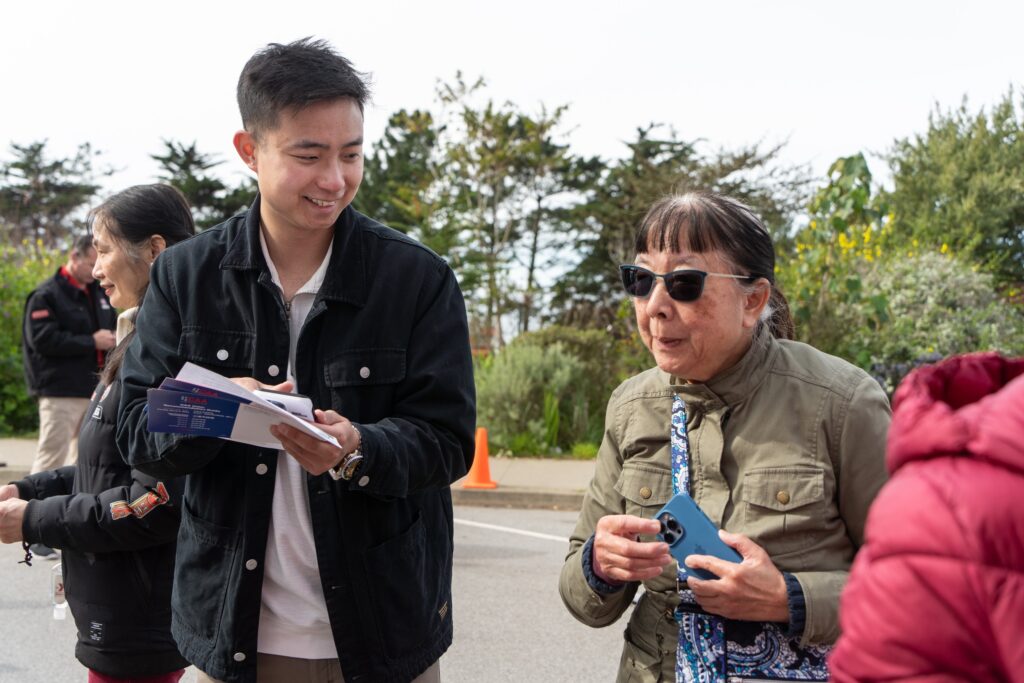Anthony Huang is a community advocate in CAA’s Economic Justice Program, which helps immigrants navigate employment in San Francisco. Clients come to Anthony to get guidance on crafting resumes, applying for jobs online, preparing for interviews, and connecting with prospective employers. Because our clients face language barriers, Anthony helps them with forms and applications, and even accompanies them to job fairs to provide translation.
While he mostly works directly with clients, he also does outreach to both clients and employers. Establishing relationships with employers can create job opportunities for CAA’s clients.
We spoke to Anthony about how his own life experiences dovetail with his work.
How does your work relate to you?
I am a first generation immigrant who saw firsthand how difficult it is to be an immigrant. My parents came here without knowing any English and worked jobs that paid less than minimum wage. My mom took me to school every morning and worked a part-time job where she walked around the city for five hours until it was time to pick me up. She only made $5 an hour, and did this for two years until I was old enough to take public transportation by myself. To this day, she occasionally has problems with her joints due to the physical demands of this job.

My dad worked in construction and many times, he had to walk one to two miles to his worksite, carrying his bag of tools because he didn’t have a car, and there was no transit nearby. He went from being a highly respected high school counselor in China to being bullied for not speaking English and looked down upon by his coworkers for not having construction skills. I know that he regrets immigrating to America, but he did it for his family. He believed that America would give his children more opportunities, and he was willing to throw away the life he built in China.
The sacrifices our parents make for us are so piercing. How did witnessing that affect you?
Growing up as a child, I didn’t understand the struggles my parents went through. But as I got older I started to understand what it really takes for immigrants to come to America. Using my and my family’s life experiences, I want to help immigrant families find stable income so that they can provide for their family and help them avoid the hardships that my parents went through. I wish that my parents had been aware of the employment resources accessible to them when I was young; it would have significantly eased their lives.
Can you tell us about a memorable client that you worked with?
I worked with a client named Yonghua Chen, who had immigrated with his family from Taishan to San Francisco. He heard about CAA’s employment services from our programs team tabling at City College’s Chinatown campus. Yonghua and his wife walked in asking if we could help them find a job. They didn’t speak any English, so it was hard at that time to place them with jobs.
Two or three weeks later, though, we received an email from the City and County of San Francisco that they were hiring for a position called a public service aide that required no English language skills. The job is essentially a street sweeping job. Our team quickly jumped into action, calling clients. Most were not interested due to the nature of the job and the low wage. I remembered that Yonghua needed a job, so I called him. He quickly said he was interested. He had been working near the pier as a laborman. He told me that he found the job through an employment agency that took 30% of his paycheck. I knew right away that I needed to get him out of this job because it was an exploitative situation.
City government jobs can require a lot of paperwork. Was that hard to navigate?
It wasn’t easy! After I helped him apply for the position, Yonghua was given a conditional offer letter. The conditions were that he must go to various offices in the city to complete all of his onboarding. Because Yonghua had only been in San Francisco for less than three months, he had no idea where and how to go. He also didn’t know how to take public transportation.
Seeing that it would be impossible for Yonghua to do all of these things alone, I took him to the Public Works office for onboarding, to SF General for his health screening, to another location to do blood tests, and then to an office downtown for his fingerprint scans. We took the bus, and during the trip, I interpreted for Yonghua, taught him how to use Google Maps, how to navigate the Muni system, and showed him the different bus routes in the city. And this doesn’t even include the digital literacy lessons that I taught him, from reading and forwarding emails to something as simple as sending a picture via text message.
Hopefully he got the job after going through all those requirements!
A month later, he signed the final offer letter. But more importantly, he was able to support his family with a less physically demanding job that paid more and provided health insurance and benefits.
I think this client was most memorable to me because he reminded me of my dad. Yonghua speaks the same dialect as I do and we are from the same city. He had to work a difficult and demanding job because he had no other choices, just like my dad. And I guess a part of me wished that my dad had the same level of assistance navigating a new city when he immigrated here.
Will you support Anthony’s work and clients like Yonghua? Donate to CAA’s economic justice work today!



